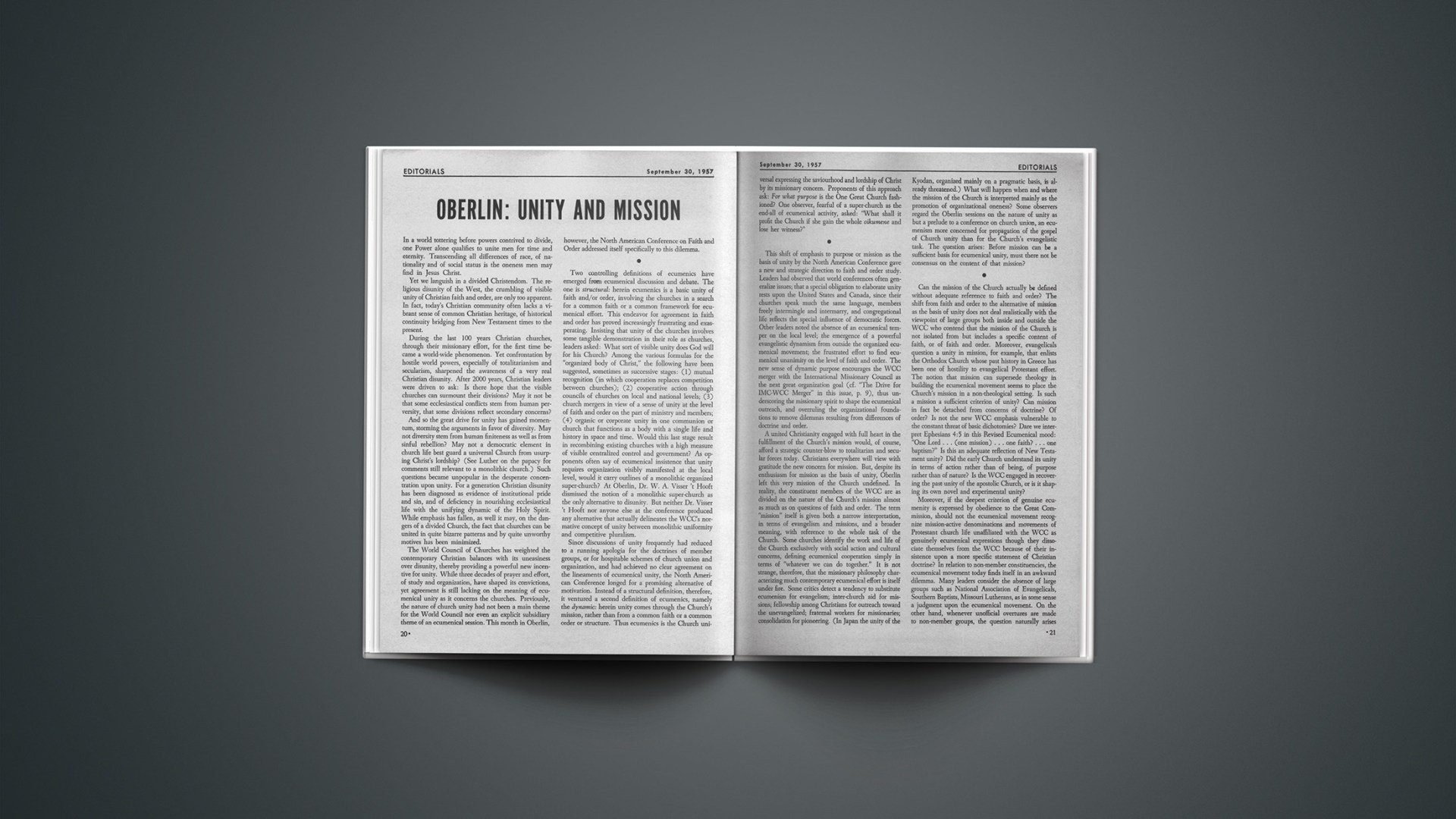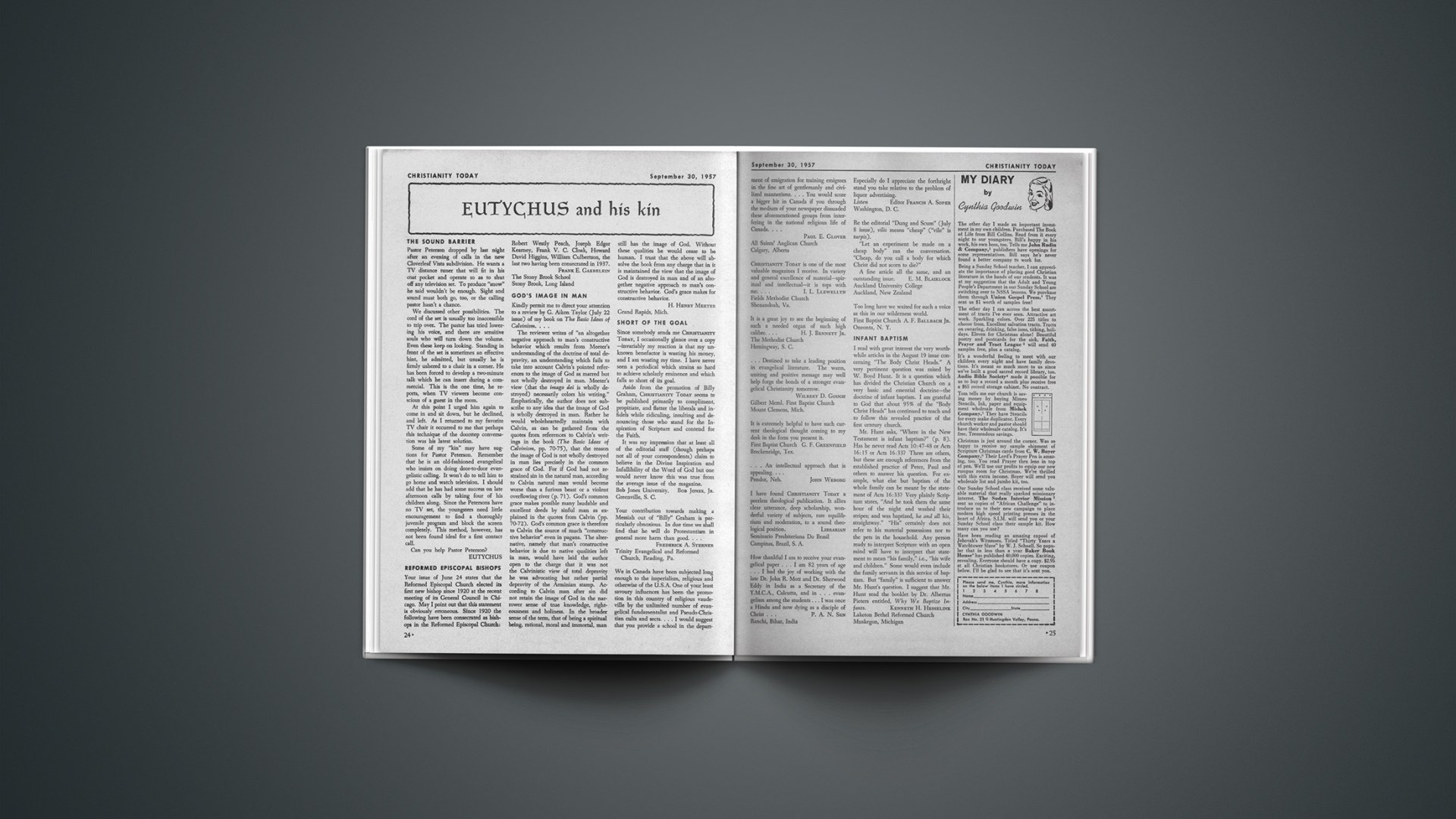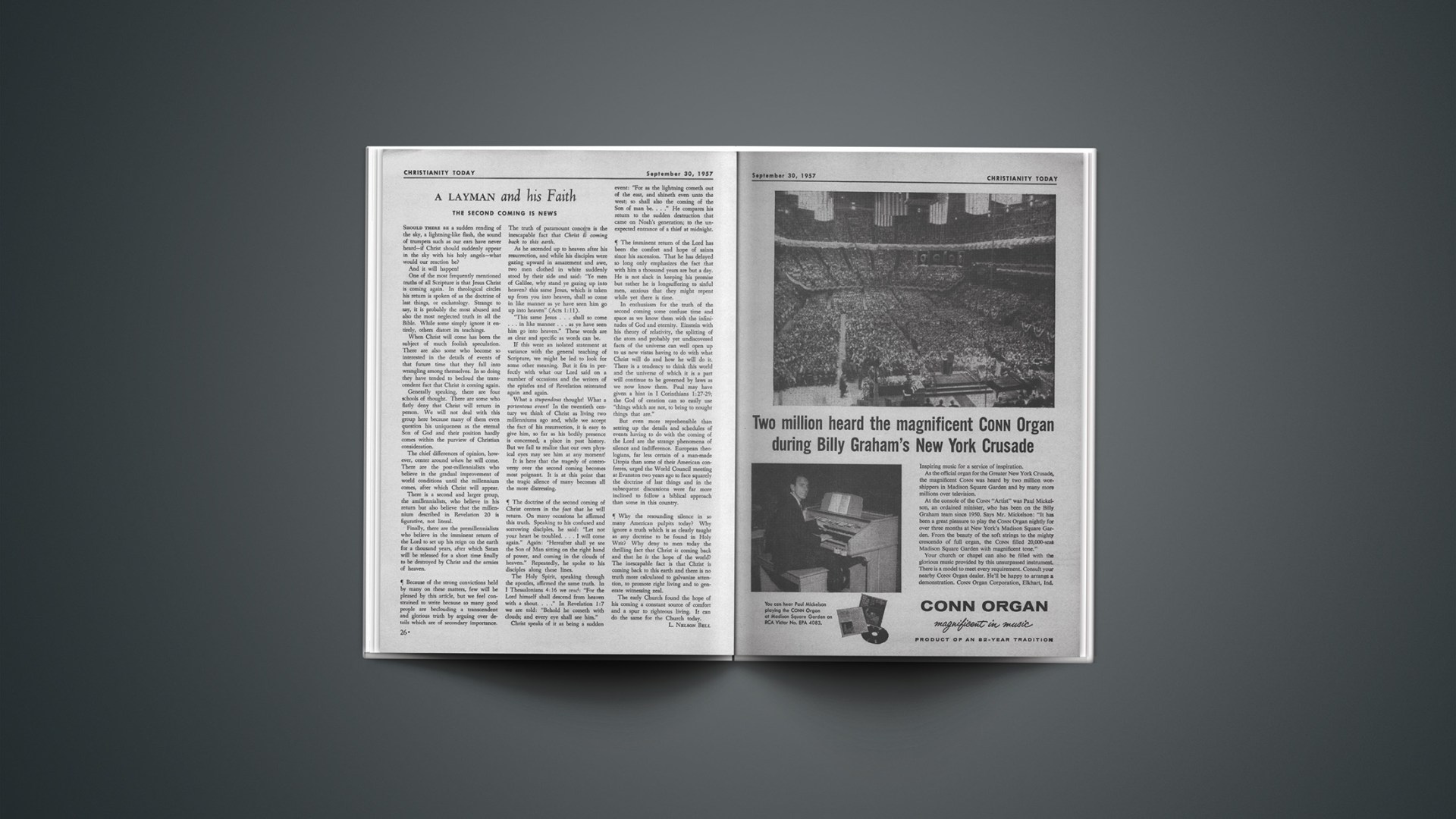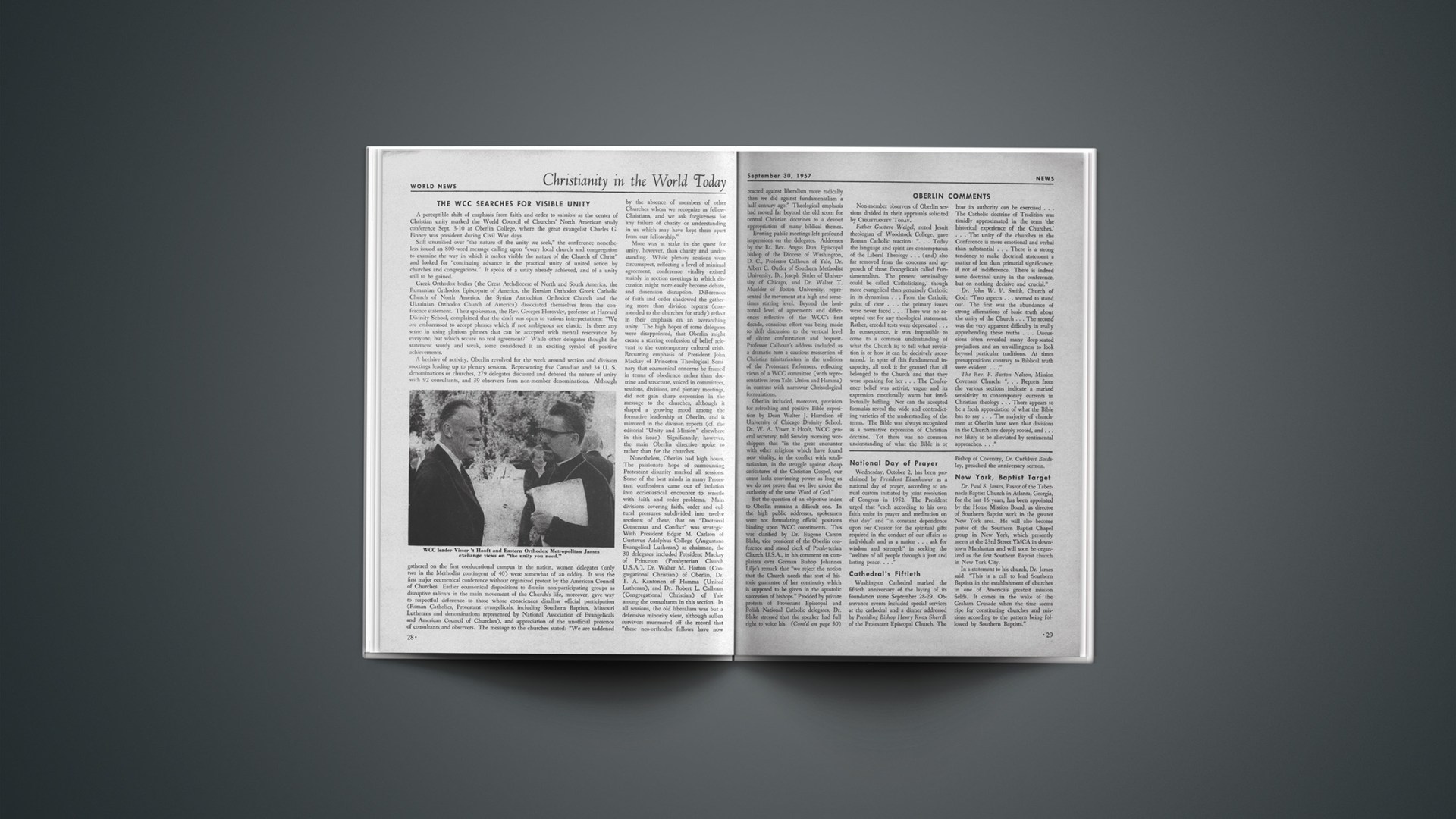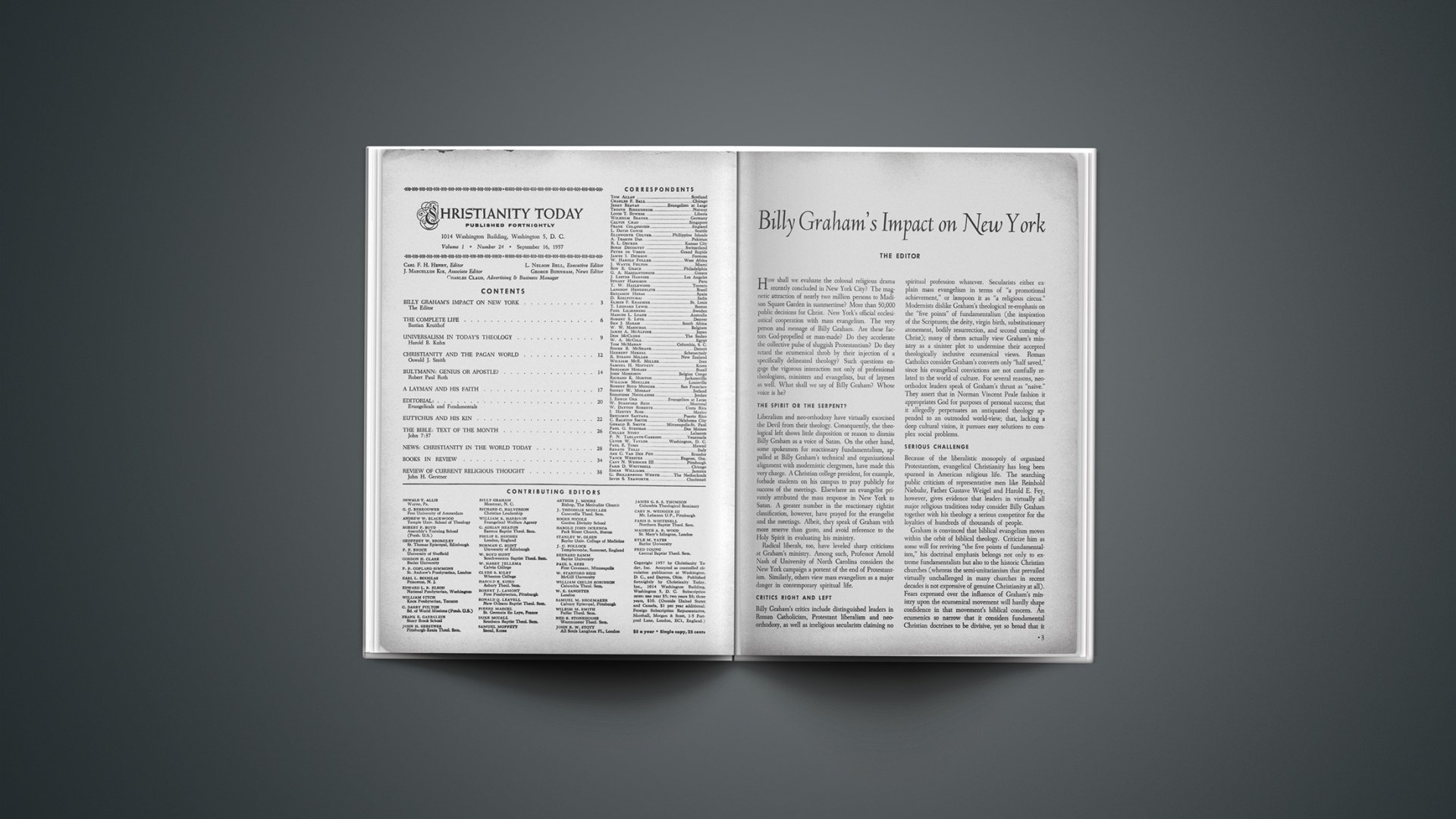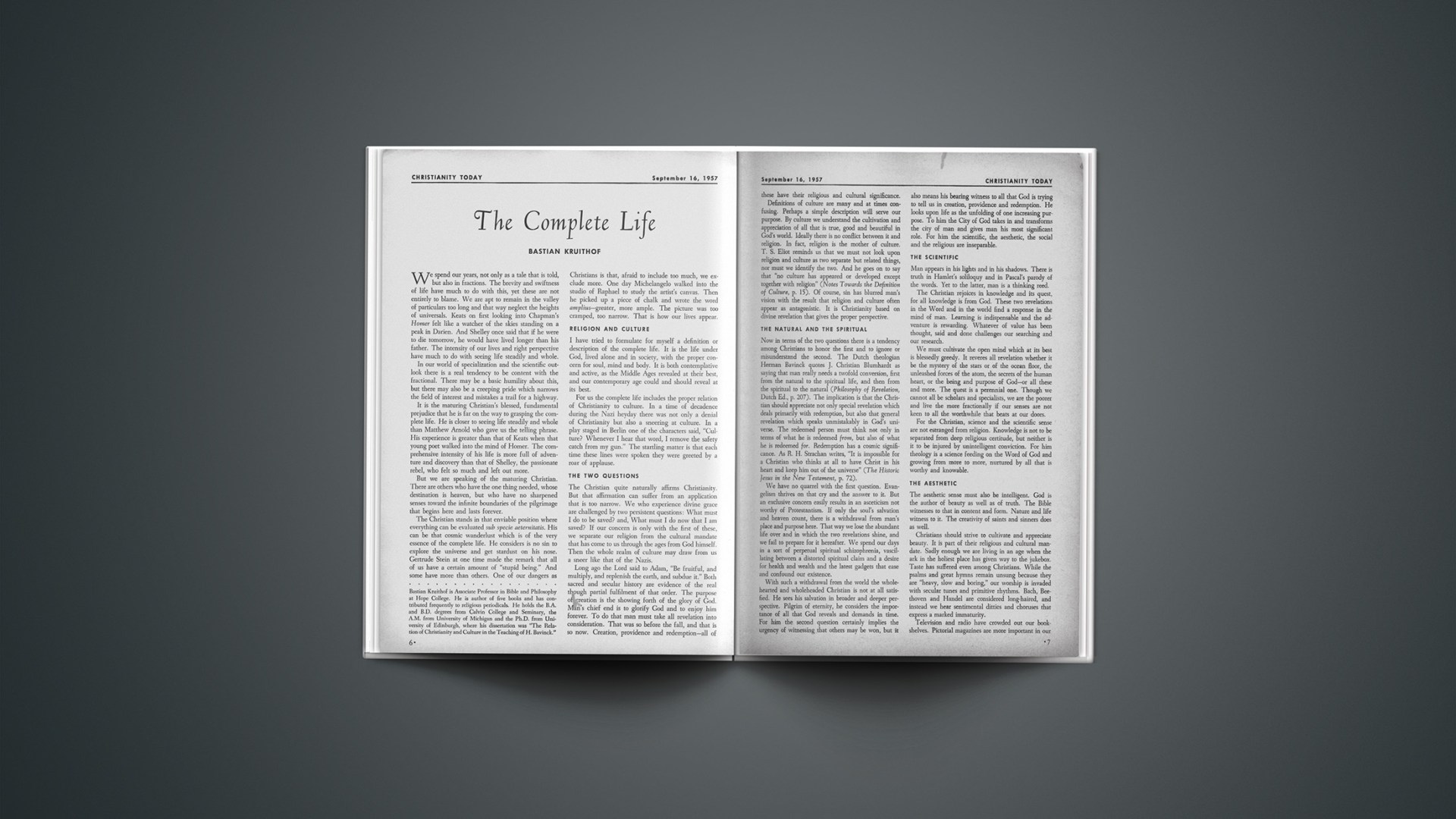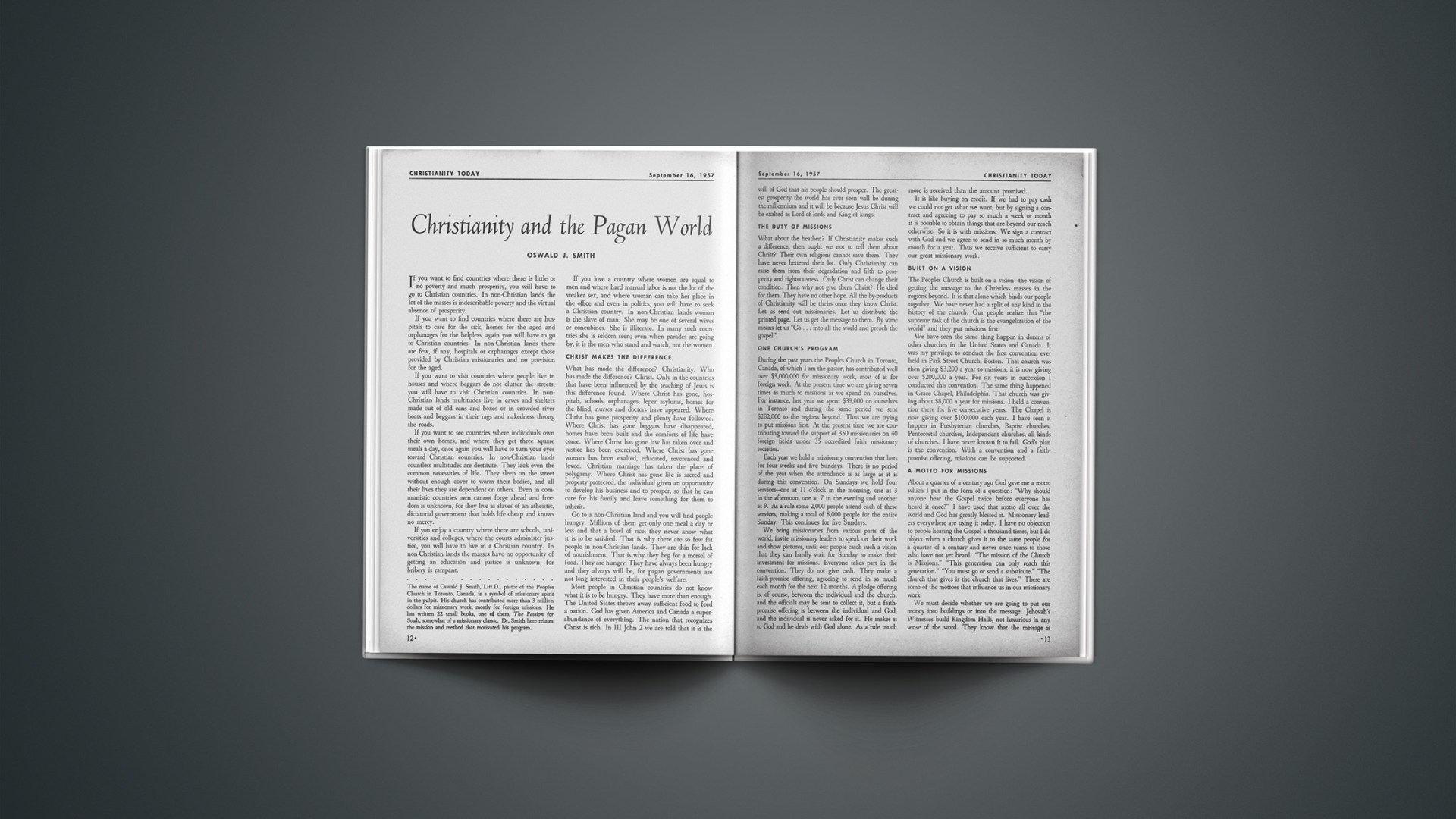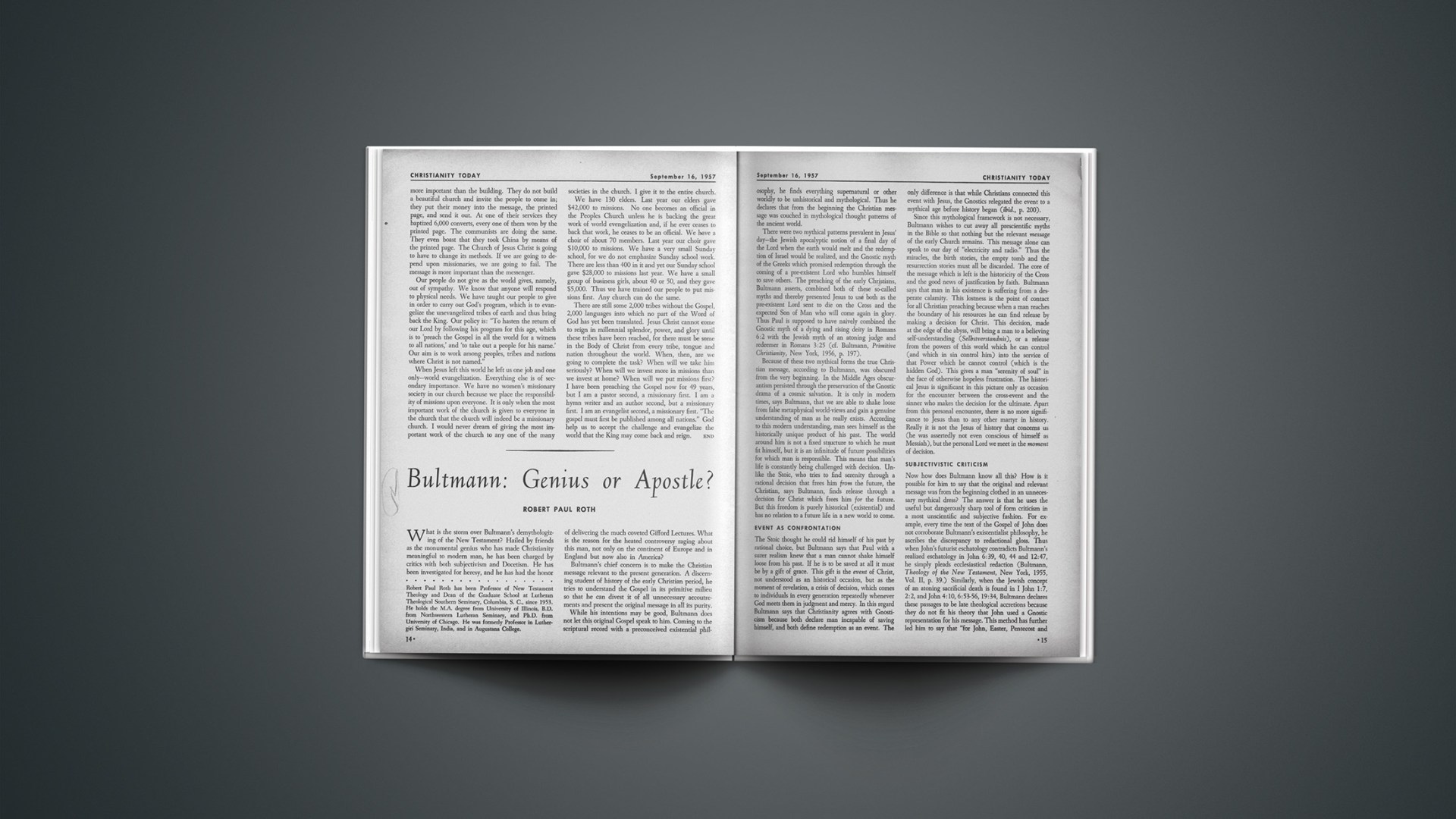In a world tottering before powers contrived to divide, one Power alone qualifies to unite men for time and eternity. Transcending all differences of race, of nationality and of social status is the oneness men may find in Jesus Christ.
Yet we languish in a divided Christendom. The religious disunity of the West, the crumbling of visible unity of Christian faith and order, are only too apparent. In fact, today’s Christian community often lacks a vibrant sense of common Christian heritage, of historical continuity bridging from New Testament times to the present.
During the last 100 years Christian churches, through their missionary effort, for the first time became a world-wide phenomenon. Yet confrontation by hostile world powers, especially of totalitarianism and secularism, sharpened the awareness of a very real Christian disunity. After 2000 years, Christian leaders were driven to ask: Is there hope that the visible churches can surmount their divisions? May it not be that some ecclesiastical conflicts stem from human perversity, that some divisions reflect secondary concerns?
And so the great drive for unity has gained momentum, storming the arguments in favor of diversity. May not diversity stem from human finiteness as well as from sinful rebellion? May not a democratic element in church life best guard a universal Church from usurping Christ’s lordship? (See Luther on the papacy for comments still relevant to a monolithic church.) Such questions became unpopular in the desperate concentration upon unity. For a generation Christian disunity has been diagnosed as evidence of institutional pride and sin, and of deficiency in nourishing ecclesiastical life with the unifying dynamic of the Holy Spirit. While emphasis has fallen, as well it may, on the dangers of a divided Church, the fact that churches can be united in quite bizarre patterns and by quite unworthy motives has been minimized.
The World Council of Churches has weighted the contemporary Christian balances with its uneasiness over disunity, thereby providing a powerful new incentive for unity. While three decades of prayer and effort, of study and organization, have shaped its convictions, yet agreement is still lacking on the meaning of ecumenical unity as it concerns the churches. Previously, the nature of church unity had not been a main theme for the World Council nor even an explicit subsidiary theme of an ecumenical session. This month in Oberlin, however, the North American Conference on Faith and Order addressed itself specifically to this dilemma.
Two controlling definitions of ecumenics have emerged from ecumenical discussion and debate. The one is structural: herein ecumenics is a basic unity of faith and/or order, involving the churches in a search for a common faith or a common framework for ecumenical effort. This endeavor for agreement in faith and order has proved increasingly frustrating and exasperating. Insisting that unity of the churches involves some tangible demonstration in their role as churches, leaders asked: What sort of visible unity does God will for his Church? Among the various formulas for the “organized body of Christ,” the following have been suggested, sometimes as successive stages: (1) mutual recognition (in which cooperation replaces competition between churches); (2) cooperative action through councils of churches on local and national levels; (3) church mergers in view of a sense of unity at the level of faith and order on the part of ministry and members; (4) organic or corporate unity in one communion or church that functions as a body with a single life and history in space and time. Would this last stage result in recombining existing churches with a high measure of visible centralized control and government? As opponents often say of ecumenical insistence that unity requires organization visibly manifested at the local level, would it carry outlines of a monolithic organized super-church? At Oberlin, Dr. W. A. Visser ’t Hooft dismissed the notion of a monolithic super-church as the only alternative to disunity. But neither Dr. Visser ’t Hooft nor anyone else at the conference produced any alternative that actually delineates the WCC’s normative concept of unity between monolithic uniformity and competitive pluralism.
Since discussions of unity frequently had reduced to a running apologia for the doctrines of member groups, or for hospitable schemes of church union and organization, and had achieved no clear agreement on the lineaments of ecumenical unity, the North American Conference longed for a promising alternative of motivation. Instead of a structural definition, therefore, it ventured a second definition of ecumenics, namely the dynamic: herein unity comes through the Church’s mission, rather than from a common faith or a common order or structure. Thus ecumenics is the Church universal expressing the saviourhood and lordship of Christ by its missionary concern. Proponents of this approach ask: For what purpose is the One Great Church fashioned? One observer, fearful of a super-church as the end-all of ecumenical activity, asked: “What shall it profit the Church if she gain the whole oikumene and lose her witness?”
This shift of emphasis to purpose or mission as the basis of unity by the North American Conference gave a new and strategic direction to faith and order study. Leaders had observed that world conferences often generalize issues; that a special obligation to elaborate unity rests upon the United States and Canada, since their churches speak much the same language, members freely intermingle and intermarry, and congregational life reflects the special influence of democratic forces. Other leaders noted the absence of an ecumenical temper on the local level; the emergence of a powerful evangelistic dynamism from outside the organized ecumenical movement; the frustrated effort to find ecumenical unanimity on the level of faith and order. The new sense of dynamic purpose encourages the WCC merger with the International Missionary Council as the next great organization goal (cf. “The Drive for IMC-WCC Merger” in this issue, p. 9), thus underscoring the missionary spirit to shape the ecumenical outreach, and overruling the organizational foundations to remove dilemmas resulting from differences of doctrine and order.
A united Christianity engaged with full heart in the fulfillment of the Church’s mission would, of course, afford a strategic counter-blow to totalitarian and secular forces today. Christians everywhere will view with gratitude the new concern for mission. But, despite its enthusiasm for mission as the basis of unity, Oberlin left this very mission of the Church undefined. In reality, the constituent members of the WCC are as divided on the nature of the Church’s mission almost as much as on questions of faith and order. The term “mission” itself is given both a narrow interpretation, in terms of evangelism and missions, and a broader meaning, with reference to the whole task of the Church. Some churches identify the work and life of the Church exclusively with social action and cultural concerns, defining ecumenical cooperation simply in terms of “whatever we can do together.” It is not strange, therefore, that the missionary philosophy characterizing much contemporary ecumenical effort is itself under fire. Some critics detect a tendency to substitute ecumenism for evangelism; inter-church aid for missions; fellowship among Christians for outreach toward the unevangelized; fraternal workers for missionaries; consolidation for pioneering. (In Japan the unity of the Kyodan, organized mainly on a pragmatic basis, is already threatened.) What will happen when and where the mission of the Church is interpreted mainly as the promotion of organizational oneness? Some observers regard the Oberlin sessions on the nature of unity as but a prelude to a conference on church union, an ecumenism more concerned for propagation of the gospel of Church unity than for the Church’s evangelistic task. The question arises: Before mission can be a sufficient basis for ecumenical unity, must there not be consensus on the content of that mission?
Can the mission of the Church actually be defined without adequate reference to faith and order? The shift from faith and order to the alternative of mission as the basis of unity does not deal realistically with the viewpoint of large groups both inside and outside the WCC who contend that the mission of the Church is not isolated from but includes a specific content of faith, or of faith and order. Moreover, evangelicals question a unity in mission, for example, that enlists the Orthodox Church whose past history in Greece has been one of hostility to evangelical Protestant effort. The notion that mission can supersede theology in building the ecumenical movement seems to place the Church’s mission in a non-theological setting. Is such a mission a sufficient criterion of unity? Can mission in fact be detached from concerns of doctrine? Of order? Is not the new WCC emphasis vulnerable to the constant threat of basic dichotomies? Dare we interpret Ephesians 4:5 in this Revised Ecumenical mood: “One Lord … (one mission) … one faith?… one baptism?” Is this an adequate reflection of New Testament unity? Did the early Church understand its unity in terms of action rather than of being, of purpose rather than of nature? Is the WCC engaged in recovering the past unity of the apostolic Church, or is it shaping its own novel and experimental unity?
Moreover, if the deepest criterion of genuine ecumenity is expressed by obedience to the Great Commission, should not the ecumenical movement recognize mission-active denominations and movements of Protestant church life unaffiliated with the WCC as genuinely ecumenical expressions though they dissociate themselves from the WCC because of their insistence upon a more specific statement of Christian doctrine? In relation to non-member constituencies, the ecumenical movement today finds itself in an awkward dilemma. Many leaders consider the absence of large groups such as National Association of Evangelicals, Southern Baptists, Missouri Lutherans, as in some sense a judgment upon the ecumenical movement. On the other hand, whenever unofficial overtures are made to non-member groups, the question naturally arises whether the invitation to “come into the WCC” ungenerously implies the non-validity of these competitive ecumenical expressions.
Christology And Confession
Ecumenical leaders doubtless will contend that the twin concerns of faith and mission have been merged into each other, rather than submerged one to the other, and that they do not expect the problem of unity to be resolved wholly on an exra-doctrinal plane. The relationship, they aver, is never serial but organic. To ask upon what mission we can engage before doctrinal agreement, or what doctrinal agreement is needed for a common mission, is for them too static an approach. They stress that the New Testament Church was united in its mission despite the absence of theological agreement at the level of the later ecumenical creeds. And in evidence of theological earnestness they point to WCC discussion on the basis of “Jesus Christ is God and Saviour” by which Amsterdam upgraded the formula “Lord and Saviour.” (Some constituents, however, do not subscribe to the formula confessionally. Seventh Day Baptist leaders were unofficially reported at Oberlin as in the WCC not because they subscribe without reservation to the affirmation that Jesus Christ is God and Saviour, but because they regard the WCC mission as more important than doctrine—a statement that passed unchallenged in the section on doctrinal consensus and conflict.)
Doubtless the evangelical criticism of ecumenical theology too often fails to grasp the importance of this central Christological affirmation. Whatever its limitations, the confession bristles with relevance in a totalitarian age. Profession of Christ’s lordship liberates the human conscience from the claims of state absolutism. Wherever a single believer recognizes Christ as God and Lord, there the existence of the totalitarian state is nullified. Communist awareness of this fact explains the persecution that Chinese Red leaders directed especially against the Christians who constituted only two per cent of the population. Moreover, the ecumenical confession emphasizes that the way to Christian unity lies through Christology, and aims to give to all discussion—including ecclesiology—a Christocentric character.
Yet the WCC confession of Christ as God and Saviour is not to be understood as a dogmatically defined statement. Even as a confession, the statement is capable of divergent theological expositions. Leaders in the WCC are far from agreement on Christology; their generalities (does the emphasis on the personal as against the doctrinal here really substitute an abstraction for the reality?) avoid a division over differences. The ready concentration on a simple Christological formula, moreover, is viewed as a symbol of theological indifference as much as a symbol of unity. Will the latitude permitted beyond this initial requirement threaten the doctrinal purity of the Church? (Note Oberlin’s unprotested offering of prayers for the dead, and the pulpit reading of The Pastor of Hermas alongside the Pauline epistles.) Does the disposition to tolerate, if not to recognize the validity of each other’s confessions and practices require a pragmatic and expedient concession at the expense of the doctrinal?
The WCC confession is far too skeletal as a basis for virile Christianity. That Jesus Christ is God and Saviour is true but hardly the whole of vital New Testament teaching; actually, this statement includes less than the elements of confession necessary to salvation, namely, that Christ died for our sins and is risen (cf. Rom. 10:9–10, 1 Cor. 15:1–4). The accepted WCC formula is inadequate, therefore, to define the Gospel of Christ. Has not the Saviour and Lord already formulated the Christian organism and mission in more adequate terms? Foundational to the unity of the early Christians stood a biblical content at least as full as that of the Apostles’ Creed.
Because the WCC confession is theologically barren, it is widely regarded as the foreboding antecedent of divisions that might have been avoided through doctrinal specificity. Especially evangelical Protestants protest the WCC’s wholesale abridgment of the doctrinal basis of Christian unity. To them such reduction is a liability rather than an asset to Christian faith and witness. Some observers aver that unless the WCC arrives at a stronger confessional basis, it ultimately faces repudiation of the movement by some of its own member churches, or through indifference to revealed theology will succumb to intellectual deterioration of ecumenical Christianity.
This approach to the WCC confession, however, does not probe the deeper issues at stake.
For one thing, the WCC is increasingly disposed to issuing additional confessional statements. Such neoconfessionalism has emerged in many major communions that avoid absolutizing their own denominational convictions (cf. recent world confessions by Presbyterians and Lutherans), but issue wide pronouncements concerning the bearing of Christian belief upon threatening cultural trends of the time. These confessions, in turn, are given ecumenical interest and status alongside the early creeds.
The ecumenical movement as such has no apparent desire, however, to reintroduce doctrine as a test, but only as a testimony. That is, no disposition is evident to recognize the existence of divinely-revealed doctrines. The influential leadership of the movement distinguishes between faith and belief; doctrines are evaluated more in terms of interpretation than of revelation. Assertedly, faith concerns the Word (not concepts and words); belief, whereby the Church articulates its faith, issues confessions only as a witness to the world, not in conformity to an authoritatively revealed declaration of what men must believe to be recognized as Christians.
The non-confessional groups, maintaining that all creeds are responsible to Scripture, decry and fear the growing confessional tendency in the WCC. The confessional groups, on the other hand, fear the WCC’s possible power over the churches through the issuance of influential definitions of the faith. Both miss the major considerations. The real issues are: What is the basis of Christian authority? What is the relation of divine revelation to reason? What is the status of Scripture as a bearer of revealed truths or doctrines? These are the crucial factors. The old liberalism, now a waning influence in ecumenical meetings, struck its deepest blow at the historic Christian faith by dissolving the authoritative note in Protestantism, by sketching divine revelation in terms either of rationalism, voluntarism or emotionalism, and by rejecting Scripture as the authoritative rule of faith and practice. Has the formative leadership of the ecumenical movement provided an adequate alternative?
Evangelicals will continue to assess contemporary ecumenity’s statement of unity and mission as given at the Oberlin sessions on doctrinal consensus and conflict by the following criteria: (1) The basis of Protestant authority. Is the Bible qualified by divine revelation and inspiration as the final and trustworthy authority in matters of faith and doctrine? (2) The importance of truth. Granting the danger of rationalizing revelation in speculative terms, and that doctrine has a view to Christian obedience, is it acknowledged that truth also has a legitimate existence for its own sake? Does divine revelation take the form both of deed and truth? Granted that religious commitment involves the whole self in relation to God, is it acknowledged that truth is essential to both faith and belief? (3) The person and work of Christ. Is it affirmed both that “Jesus of Nazareth is the Christ” and that “in him dwells all the fulness of the Godhead bodily”? Many current formulations distinguish Jesus from “the Christ in Jesus,” and prefer also to speak of “God in Jesus Christ” rather than of the personal deity of the God-man. Is it affirmed not only that men as sinners are justified by faith without personal merit, but also that they are supernaturally regenerated on the occasion of faith in the imputation of Christ’s atonement as the ground of man’s salvation?
Evangelicals are saddened by any unity in mission that relegates such verities of revelation to an optional, secondary status.
Race Relations And Christian Duty
America is in the throes of great sociological change. Never has there been more need for Christian love and restraint. That the race issue has become political is to be deeply regretted. That the spiritual problem is ignored by some and stressed to the exclusion of sociological factors by others is equally regrettable.
In recent weeks incidents have arisen that should move every Christian with righteous indignation. The deliberate mutilation of a Negro in one city is one example; justice demands the severest penalty for those found guilty. Abuse accorded the few Negro boys and girls assigned to previously all-white schools by some young people in these schools has been a disgrace.
The unfortunate situation in Little Rock is eloquently appraised by a group of white and Negro ministers in that city expressing the Christian position in these words: “There is need for all to exercise constant and diligent prayer and a love which respects the dignity of all children of God and seeks equal justice for them. Because we have not walked in the way of the Lord we now find ourselves confused, disturbed and distressed. As Christian ministers we confess our own share in the corporate sin and guilt of our state and our own subjugation to the holy judgment of God. Our one hope in this hour of crisis lies not in our own ability to change ourselves, our people, or the social structure of which we are a part, but in the power and grace of God to bring order out of confusion, good out of evil and redemption beyond judgment.”
In such situations (and they are not confined to the South) there is need for Christian love, sympathy and common sense. That the church should lead in Christian relations goes without saying. There are those who feel that she has been woefully slow in assuming her role of leadership in breaking down racial discrimination and injustice. In some instances the church has lacked courage in vindicating justice for all. But some leadership has shown more enthusiasm than good judgment, more zeal than understanding. Christian courtesy, love, humility and consideration form the only basis on which right race relations can be developed. There are vocal integrationists who themselves refuse to have social contacts with another race. There are segregationists whose personal dealings with those of another race put to shame some most ardently active on the other side. Each needs to learn from the other.
The Christian church should work for the elimination of every restriction, discrimination and humiliation aimed at people of any race. She should preach and exemplify love and compassion and consideration at all times. She should also refrain from confusing legal, spiritual, and sociological problems—for in so doing she is being neither Christian nor realistic.
END

